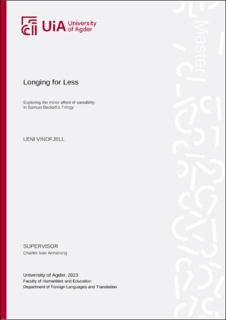| dc.description.abstract | This thesis concerns itself with analysing Samuel Beckett’s three loosely connected novels, commonly referred to as the Trilogy, in light of affect theory. Through close readings of Molloy (1951/1955), Malone Dies (1951/1956) and The Unnamable (1953/1958), I wish to explore how the minor negative affect of sansibility, a desire for lessness or inclination to exist without, is expressed by the various point-of-view characters and how this relates to their physical and mental states. Additionally, this paper will analyse how sansibility is reflected in the language, writing style, and structuring of the novels. Before delving into how this particular affect manifests in the novels themselves, I seek to determine its boundaries order to distinguish sansibility from other similar feelings and drives, before exploring how it (and, to an extent, affect in general) presents itself in other Beckett works. Throughout the thesis, I will use Sianne Ngai’s definition of ‘minor affects’ from her work Ugly Feelings (2005) to illustrate how this feeling fits in with other smaller negative emotions. | |
